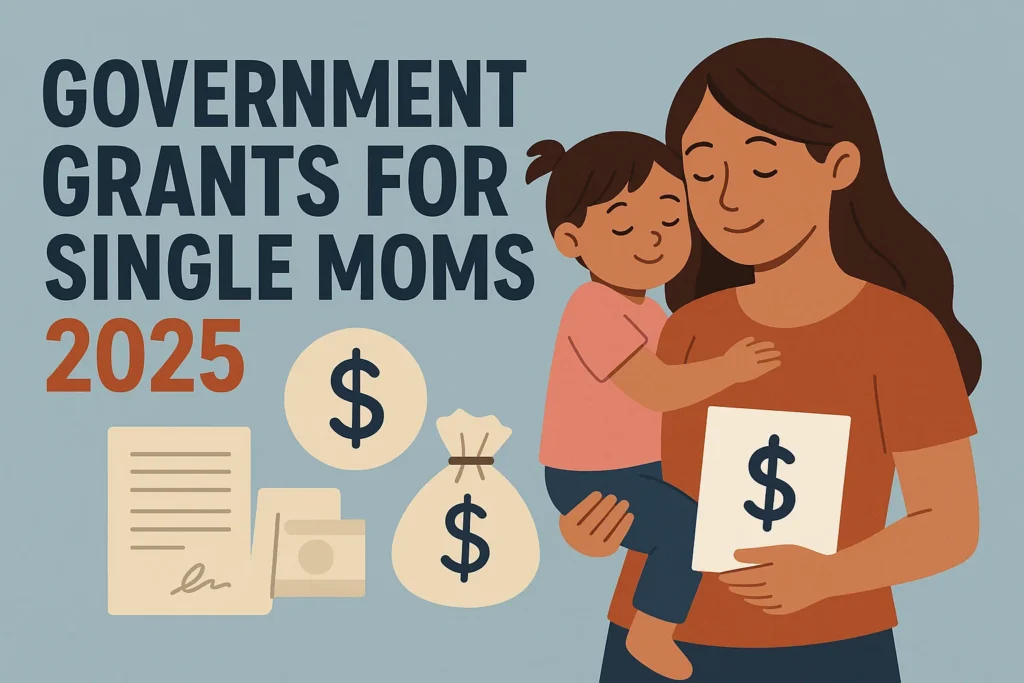Comprehensive guide to Government Grants for Single Moms in 2025, detailing both federal and state-specific programs across the United States. This resource aims to help single mothers navigate available financial assistance tailored to their unique needs.
Being a single mom is tough—emotionally, physically, and financially. In 2025, the U.S. government continues to recognize the unique challenges faced by single mothers and offers a variety of grants to ease their burdens. These grants are not just generous gifts—they are lifelines designed to keep vulnerable families stable, secure, and on the path to self-sufficiency.
Table of Contents
🏛️ Why Are Government Grants for Single Moms Necessary?
Let’s face it—raising a child on a single income (or no income at all) is extremely difficult. From housing and food to healthcare and child care, the costs add up quickly. According to U.S. Census data, over 80% of single-parent families are headed by mothers, and a significant portion live below the poverty line.
These grants are designed to:
- Prevent homelessness among mothers and their children.
- Ensure proper nutrition and healthcare for young children.
- Enable access to education or job training, so moms can re-enter or advance in the workforce.
- Reduce the reliance on long-term welfare by offering short-term help with housing, food, utilities, and more.
In simple words, grants help single moms survive today so they can build a better tomorrow.
🧠 What Is the Government’s Thought Process?
The U.S. government doesn’t just provide aid out of sympathy—it does so as a strategic investment. By helping single moms stay on their feet, the government reduces future spending on:
- Emergency healthcare
- Child welfare services
- Homeless shelters
- Criminal justice costs related to poverty-driven crime
In 2025, policymakers have shifted focus toward “economic mobility”, meaning they want recipients to move from welfare to work. That’s why many grant programs now come with education incentives, child care support, and job training.
Another priority is breaking the cycle of poverty. Studies show that when a single mom receives consistent support, her children are more likely to finish school, stay out of trouble, and contribute positively to the economy.

🚫 How Do People Lose These Grants?
Government grants are generous—but they come with rules. Many people lose their benefits simply because they fail to comply with these guidelines. Here’s how:
1. Income Misreporting
If a recipient fails to report a raise, second job, or new source of income, she risks being disqualified or even facing legal action.
2. Not Renewing Applications
Programs like SNAP or Medicaid require regular re-certification. If a mom forgets or delays reapplying, she may lose coverage—sometimes for months.
3. Missing Required Work or School Hours
Many grants, such as TANF, require recipients to participate in work activities or job training. Not meeting those requirements could trigger a suspension or termination.
4. Providing False Information
Falsifying details (e.g., number of dependents or household income) may lead to a permanent ban from future assistance.
🇺🇸 Federal Grants and Assistance Programs
1. Temporary Assistance for Needy Families (TANF):
Provides monthly cash assistance to low-income families with children. Eligibility and benefit amounts vary by state.afrixe.com+6Single Mother Guide+6newslok24.com+6
2. Supplemental Nutrition Assistance Program (SNAP):
Offers food-purchasing assistance to low-income individuals and families. Benefits are distributed via Electronic Benefit Transfer (EBT) cards.
3. Women, Infants, and Children (WIC):
Supplies nutritious foods, healthcare referrals, and nutrition education for pregnant women, new mothers, and young children.
4. Child Care and Development Fund (CCDF):
Assists low-income families in obtaining child care so they can work or attend training/education. Eligibility requirements and application processes vary by state.undergradatlas.com+7CuraDebt+7Medium+7newslok24.com
5. Low Income Home Energy Assistance Program (LIHEAP):
Helps eligible low-income households with heating and cooling energy costs.newslok24.com+3Single Mother Guide+3CuraDebt+3
6. Section 8 Housing Choice Voucher Program:
Provides rental assistance to low-income families, allowing them to afford decent, safe, and sanitary housing in the private market.newslok24.com+4Medium+4CuraDebt+4
🗺️ State-Specific Grants and Programs
California:
- CalWORKs (California Work Opportunity and Responsibility to Kids):
Offers cash aid and services to eligible families with children.Single Mother Guide+1newslok24.com+1 - Cal Grant:
Provides financial aid for low- and middle-income students to attend college.Single Mother Guide+1Single Mother Guide+1
Texas:
- Texas Workforce Commission (TWC) Child Care Services:
Subsidizes child care expenses for low-income families.newslok24.com+1CuraDebt+1 - Texas Temporary Assistance for Needy Families (TANF):
Offers temporary financial assistance and support services.CouponFollow+3newslok24.com+3Medium+3
New York:
- New York State Tuition Assistance Program (TAP):
Provides grants to eligible residents to help pay tuition at approved schools.CouponFollow+1Business Insider+1 - Inflation Rebate Checks:
As part of the Fiscal Year 2026 Budget, New York is issuing inflation rebate checks of up to $400 to approximately eight million residents to alleviate financial burdens caused by inflation. The US Sun
Florida:
- Family Assistance Program:
Provides temporary cash assistance and support services to eligible families with children.newslok24.com
Georgia:
- HOPE Grant:
Assists students enrolled in certificate or diploma programs at eligible institutions. - UpTogether Program:
Offers monthly payments to families earning less than 80% of the area median income. The US Sun
Illinois:
- Monetary Award Program (MAP):
Provides grants to Illinois residents attending approved Illinois colleges. - UpTogether Program:
Similar to Georgia, offers monthly payments to qualifying families. Single Mother Guide
Ohio:
- Ohio Mothers Trust:
Provides single mothers in Columbus with monthly payments to enhance financial security. Medium
Indiana:
- Frank O’Bannon Grant:
Offers need-based financial aid to Indiana residents attending eligible institutions.The US Sun+8Single Mother Guide+8CouponFollow+8 - Healthy Families Indiana:
Provides support services to expecting and new parents, including home visits and parenting education. Medium
Kentucky:
- Kentucky Tuition Grant:
Provides need-based aid to help qualified Kentucky residents attend eligible private colleges.Single Mother Guide+1Single Mother Guide+1 - Kentucky Transitional Assistance Program (KTAP):
Offers short-term financial assistance to eligible low-income families. Single Mother Guide+1newslok24.com+1
Louisiana:
- Family Independence Temporary Assistance Program (FITAP):
Provides cash assistance to families with children earning at or below 200% of the federal poverty level.Single Mother Guide - Louisiana GO Grant:
Assists Pell-eligible students in affording the cost of attending college. Single Mother Guide
Massachusetts:
- MASSGrant:
Offers need-based financial aid to undergraduate students demonstrating the greatest financial need.Single Mother Guide - Transitional Aid to Families with Dependent Children (TAFDC):
Provides cash assistance to needy families with children and pregnant women. Single Mother Guide
Michigan:
- Michigan Tuition Grant (MTG):
Available to undergraduate students based on financial need for use at non-profit colleges.Single Mother Guide+1undergradatlas.com+1 - Family Independence Program (FIP):
Provides cash assistance, child care, and food to low-income families with minor children. Single Mother Guide
Minnesota:
- Minnesota State Grant:
Helps students from low- and moderate-income families pay for educational expenses.Single Mother Guide - Springboard for the Arts Program:
Offers monthly payments to artists, including single mothers, to support financial stability. The US Sun
Virginia:
- Virginia Tuition Assistance Grant (VTAG):
Helps Virginia residents attend accredited private, nonprofit educational institutions in the state. CouponFollow
Wyoming:
- Wyoming College Access Grant:
Provides need-based grants to Wyoming residents attending college for the first time. Single Mother Guide
20 frequently asked questions (FAQs) on Government Grants for Single Moms in 2025,
🔹 General FAQs About Government Grants for Single Moms
1. What are government grants for single moms?
Government grants are financial aid programs (usually non-repayable) designed to help low-income single mothers meet basic needs such as food, housing, education, child care, and healthcare.
2. Do I have to pay back a grant?
No, government grants typically do not require repayment, unlike loans.
3. How can I apply for grants as a single mother?
Most grants can be applied for through state human services websites, Benefits.gov, or local social service offices.
4. What documents do I need to apply for a grant?
Common documents include proof of income, ID, Social Security number, residency proof, and children’s birth certificates.
5. What is the difference between TANF and SNAP?
- TANF (Temporary Assistance for Needy Families) offers cash aid.
- SNAP (Supplemental Nutrition Assistance Program) provides food assistance via EBT cards.
🔹 State-Specific & Program-Related FAQs
6. Do all states offer the same grants?
No. While some programs like SNAP or TANF are federal, states manage their own rules, eligibility, and benefits. Some states also offer unique programs like CalWORKs in California or UpTogether in Illinois.
7. What is WIC, and who qualifies?
WIC (Women, Infants, and Children) is a program offering food and health support to pregnant women, new moms, and children under 5. You must meet income eligibility and nutritional risk criteria.
8. Can I receive grants if I have a part-time job?
Yes, as long as your household income is within the program’s threshold, you can qualify even with part-time or low-wage employment.
9. Are there grants available for education?
Yes. Grants like Pell Grants, Cal Grants (CA), and Frank O’Bannon Grants (IN) help single moms attend college.
10. Can undocumented single moms get grants?
Most federal grants require citizenship or legal residency. However, some state or nonprofit programs may offer limited aid.
🔹 Child Care & Housing Assistance FAQs
11. Is there financial help for child care?
Yes. Programs like the Child Care and Development Fund (CCDF) help cover daycare and preschool costs for low-income families.
12. Are there any housing assistance programs for single mothers?
Yes. The Section 8 Housing Choice Voucher Program and state-level rental subsidies help with affordable housing.
13. How long can I receive housing or TANF support?
Most programs have time limits—for example, TANF generally caps at 60 months. States may have shorter or extended durations based on circumstances.
🔹 Healthcare, Energy, and Utility Help FAQs
14. Are there grants that help with medical bills?
Yes. Programs like Medicaid and CHIP offer free or low-cost healthcare to eligible families.
15. What is LIHEAP and how does it help?
LIHEAP (Low-Income Home Energy Assistance Program) helps pay heating and cooling bills or provides weatherization assistance.
🔹 Special Situations & Financial Planning FAQs
16. Can I apply for multiple grants at the same time?
Yes. You can receive multiple types of aid (e.g., SNAP, TANF, WIC, and housing) if you qualify for each individually.
17. What if my application is denied?
You have the right to appeal most government grant decisions. Contact your local assistance office for appeal procedures.
18. Are there emergency cash grants for single moms?
Yes. States often offer emergency hardship funds, and nonprofits like Catholic Charities or Salvation Army also help.
🔹 Tech & Access FAQs
19. Is there a website where I can see all grants I’m eligible for?
Yes, visit Benefits.gov or your state’s Department of Human Services website.
20. Are there mobile apps to track benefits?
Yes. Many states now use mobile apps like MyBenefits, AccessNYC, or GetCalFresh to apply for and track benefit usage.
Final Thought
Government grants for single moms in 2025 are more than just handouts—they’re stepping stones. They provide relief in hard times and open doors for better futures. But to keep them, recipients must stay informed, follow the rules, and actively work toward independence.
Know the rules, apply on time, and use the help wisely—because every single mom deserves a fair shot at building a life of dignity and success.

